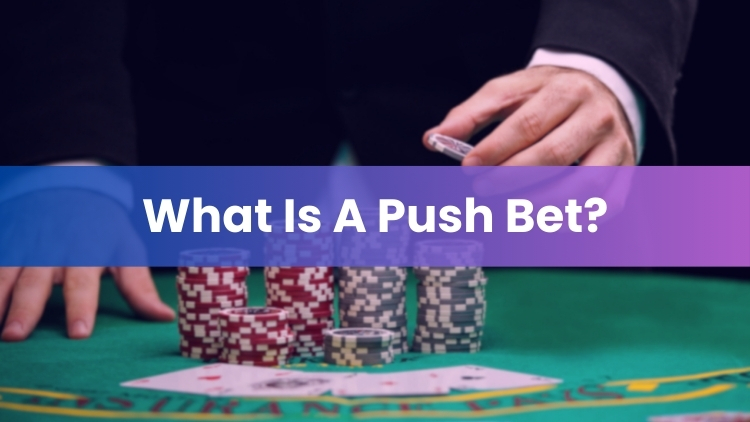
Imagine this: you place a bet, wait patiently for the outcome, and when the moment finally arrives, neither you nor the casino wins. This is the intriguing scenario that unfolds in what is known as a 'push' in the world of betting.
A push might sound a bit complex at first, but don't worry - it is actually quite straightforward. Whether you are a complete beginner or have placed a few bets online, understanding what a push bet is can add to your wider gambling understanding by adding clarity to your experience, which could result in your experience being more enjoyable.
In this post, we'll break down everything you need to know about push bets, helping you become more informed and confident in navigating the betting landscape. Keep reading to find out what happens when a bet ends in a push and how it could impact your bets.
Push Bet Meaning
A push bet occurs when there is a tie between you and the casino. In simple terms, neither side wins or loses. It is like when a football match ends in a draw after 90 minutes; both teams leave the pitch with the same score.
In many casino games, the main aim is for your total to be higher than that of the dealer or other players. However, if both sides end up with the same total, that is when a push happens. This does not result in a win or loss - it is more of a neutral outcome.
In the event of a push, the casino typically returns your original stake. It is as if the bet never happened, and you are free to use that money for another round or to cash out.
Understanding when a push can occur helps you manage your expectations. It is a part of the gambling experience, and knowing what it involves and what it means for your bet can help you to better understand what is happening if such scenarios ever come up for you.
Push bets are especially common in games like blackjack and sports betting, so being familiar with them can be quite handy if you participate in either.
What Causes a Bet To Push?
A bet results in a push when the outcome leads to a tie between you and the casino or, in some cases, between you and other players. Both sides have reached the same score or result, leaving no overall winner.
In card games like blackjack, a push occurs when your hand and the dealer’s hand total the same value. For example, if both you and the dealer have hands totalling 20, it is a push.
Push bets can also happen in sports betting. Say you placed a bet on a football team to win and the match ends in a draw, depending on the betting terms, this might be considered a push.
It is important to remember that a push does not mean you lose your money. Instead, your original bet is returned to you as if the bet never happened in the first place; there are no winnings but also no losses.
Knowing when a push can occur and what happens can help you better understand these games and manage your bets wisely.
Do You Lose a Bet On a Push?
If a bet ends in a push, you do not lose your money. It might seem a bit unusual, but the outcome of a push is simply neutral. All that happens is your original stake is returned to you.
This means that if the game or event you bet on results in a tie and it is classified as a push, you have not lost anything. Your balance remains unchanged because the bet is essentially cancelled.
It is worth noting that a push is a special condition where neither a win nor a loss is registered. Instead, it is as if the bet was never placed and that hand or round never happened. You do not receive any winnings, but you do not lose your bet either, so you are in the same position as before the round.
Push bets are common in games like blackjack and certain types of sports bets. Understanding this can help you manage your finances better and helps to ensure you are prepared if a push situation should ever arise.
What Is an Example Of a Push Bet?
To get a clearer picture, let’s look at an example in blackjack. Imagine you are playing a hand and end up with a total of 18. The dealer draws their cards and also ends up with 18. Since both totals are the same, and the house rules do not require the dealer to hit at this value, the result is a push.
Another common example occurs in sports betting. Suppose you place a bet on a football team to win a match, but you opt for a ‘draw no bet’ option. If the match ends in a draw when the 90 minutes are up, then you simply receive your stake back because your team has not won, so you don’t get any winnings, but they have not lost either, so you do not lose the bet. It is simply returned to you.
In both cases, the bet has neither lost nor won. Leaving the only outcome to be you receiving your original stake back, without any profit or loss, as if the bet never happened. This simple return of funds allows you to use them again for another bet if you choose, or you can simply withdraw them from your account if you prefer.
These examples show how push bets can pop up in different types of games and help you recognise what to expect if they occur.
**The information provided in this blog is intended for educational purposes and should not be construed as betting advice or a guarantee of success. Always gamble responsibly.
